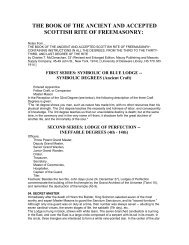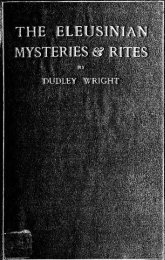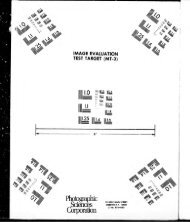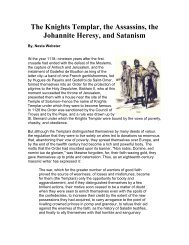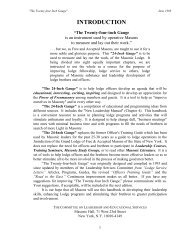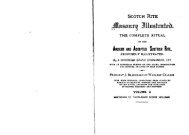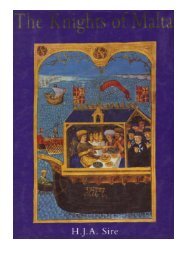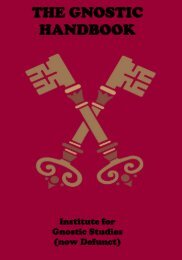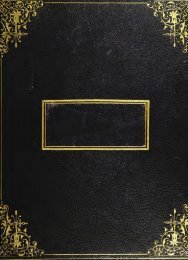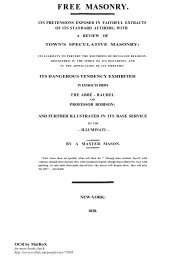The History of Initiation - The Masonic Trowel
The History of Initiation - The Masonic Trowel
The History of Initiation - The Masonic Trowel
Create successful ePaper yourself
Turn your PDF publications into a flip-book with our unique Google optimized e-Paper software.
100 HISTORY OF INITIATION.<br />
for a considerable period. <strong>The</strong> initiated, whether males<br />
or females, some habited in splendid attire, with crowns<br />
28<br />
or mitres on their heads some ; bearing the thyrsis ;<br />
some the sacred vessels, 29 while others, covered with very<br />
30<br />
little clothing, mixed promiscuously, and danced to the<br />
31<br />
sound <strong>of</strong> musical instruments played by the Corybarites ;<br />
keeper <strong>of</strong> swine ; and Eumolpus, a shepherd, from whom the race <strong>of</strong><br />
the Eumolpidse descended, and the illustrious name <strong>of</strong> Cecropidae was<br />
derived, and who afterwards flourished as bearers <strong>of</strong> the Caduceus,<br />
Hierophants, and Cryers belonging to the sacred rites. Baubo,<br />
therefore, who was <strong>of</strong> the female sex, received Ceres, wearied with<br />
complicated evils, as her guest, and endeavoured to soothe her sorrows<br />
by obsequious and flattering attendance. For this purpose she<br />
entreated her to pay attention to the refreshment <strong>of</strong> her body, and<br />
placed before her a miscellaneous potion to assuage the vehemence<br />
<strong>of</strong> her thirst. But the sorrowful goddess was averse to her<br />
solicitations, and rejected the friendly <strong>of</strong>ficiousness <strong>of</strong> the hospitable<br />
dame. <strong>The</strong> matron, however, who was not easily still repulsed, continued<br />
her entreaties, which were as obstinately resisted by Ceres,<br />
who persevered in her refusal with unshaken constancy and invincible<br />
rigour. But when Baubo had thus <strong>of</strong>ten exerted her endeavours to<br />
appease the sorrows <strong>of</strong> Ceres, but without any effect, she at length<br />
changed her arts, and determined to try if she could not exhilarate<br />
by prodigies a mind which she was not able to allure by serious attempts."<br />
And in this she succeeded by an expedient too obscene to<br />
be detailed here, which was imitated in the initiations, (Pamphleteer,<br />
vol. viii.)<br />
28 <strong>The</strong> Thyrsis was a long pole adorned with garlands and ribbons,<br />
intermixed with sprigs <strong>of</strong> the vine and leaves <strong>of</strong> ivy (Eurip. Bacch.,<br />
v. 176, et passim,) and having at the end a conrcal fruit like a pomegranate<br />
or pine. It represented the phallus. Vid. Bishop Cumberland's<br />
Treatise on Sanchoniatho's Phenician <strong>History</strong>, p. 68. <strong>The</strong><br />
phallus amongst the Egyptians was the symbol <strong>of</strong> fertility. (Savary's<br />
Letters on Egypt, vol. ii., p. 40.) Athenseus (1., i.,) states distinctly<br />
that Priapus and Dionysus were one and same person ; which accounts<br />
for the gross obscenity <strong>of</strong> these rites.<br />
29 Plut. de. Isid. et Osir., p. 336.<br />
30 Ovid (Metam., 1. iv., v. 6,) says that they had the skins <strong>of</strong> beasts<br />
thrown over their naked bodies. <strong>The</strong> bacchantes are generally de-<br />
picted on gems, either naked, or merely covered with a thin transparent<br />
garment. Sometimes the sexes exchanged clothes, an abomination<br />
expressly forbidden to the Israelites in the law <strong>of</strong> Moses, which points<br />
out the very early date <strong>of</strong> a custom which was the source <strong>of</strong> many<br />
licentious pollutions. (Deut. xxii., 5.) " <strong>The</strong> woman shall not wear<br />
that which pertaineth unto a man, neither shall a man put on a<br />
woman's garment, for all that do so are abomination unto the Lord<br />
thy God."<br />
31 Wait. Orient. Ant., p. 218. Sophocles<br />
the<br />
" Immortal leader <strong>of</strong> the maddening choir,<br />
Whose torches blaze with unextinguish'd fire ;<br />
addresses Bacchus as



